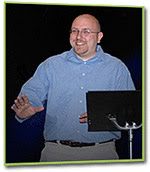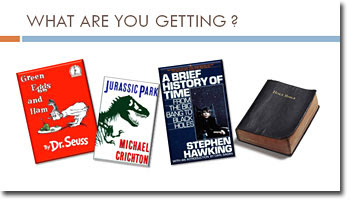Your Future in the:
Bible – Tribulation – Rapture – Millennial Kingdom – Heaven – Q&A

Steve Howell
Adult Education Minister
Tonganoxie Christian Church
I want to thank my wife for something pretty cool she allowed me to borrow. It’s a neat device called an iPod Touch. For my journey I was able to take it on the plane. It does lots of really cool and amazing things. I don’t know if you have had a chance to play around with something like this, but the technology is amazing. You can listen to music, you can watch videos, and you can have all sorts of different things to play around with.
Five years ago if I said the word “Kindle” to you, you would think of fire, right? Today you would think about the most gifted item in the history of Amazon.com.
Here’s the thing, reading is making a comeback. Woot! Some of you would be more excited than others. Well, I think reading’s comeback is really cool. People are reading in more and more places than ever before because of devices like the iPod Touch, the Kindle, and the Nook.
All of these e-reader devices have really increased the number of book sales out there. E-book sales have climbed to about 10% of the entire market, and the sale of these devices have been up 193% since just last year alone. It is really moving forward. It is growing. And, I don’t know exactly why this is happening. My gut says it’s just because people finally think that it is cool to read when you are holding a device, rather than a big bound copy of Lord of the Rings. I think that it just looks way cooler in public on an e-reader. Regardless of the reason, I think it’s great that more of us, and therefore more of you, are reading in increased numbers.
What are you getting?
This brings up an interesting question when we think about reading that I want us to consider. What are you getting from your books?

Different books contribute differently to our lives. I just grabbed a few random examples of books out there. We have everything from, Green Eggs and Ham, Jurassic Park, Stephen Hawking’s A Brief History of Time, and the Bible. We start looking at these books and think, “What do we get from them?” Does it create enjoyment?
For some people, Green Eggs and Ham is a lot of fun. My kids have enjoyed that. Other people with a sick, twisted mind enjoy A Brief History of Time, and that’s okay. Does it teach information? Certainly all of them teach information to some degree. Even fiction you can learn from. Does it showcase talent? Yes. Does it elicit emotion? Yes.
What is truth?
But, the big question is: What is truth? Are we getting truth from this material? Because, I don’t know. I read Green Eggs and Ham and I think, “Well, you know, I’m not a fan of eating green eggs and ham, so maybe there is some truth there.” I look at Jurassic Park and find there are some truthful things in there. There are some truthful things maybe in Stephen Hawking’s books. Then, with the Bible, when you start asking people, “Is it true?” Well, then they are not so sure.
People don’t want to take a real firm stand on truth. That is not a criticism of anyone or any book. It is simply an acknowledgment that we have difficulties with the concept of truth.
Books fill us with ideas, and we think about these ideas, but are they true? It is hard to say with certainty. We just have to start to wonder.
That question — “What is truth?” — has been around for a long time, even for hundreds and hundreds of years ago since it was first asked. Do you remember a guy named Pontius Pilate? During the crucifixion trial of Jesus, Pilate asked that famous question: “What is truth?”
Taken seriously, “What is truth?” is a heavy question that leads us into some big philosophical arguments. There is a huge realm of philosophical study out there where people discuss the nature of truth. The entire field of epistemology is available for people to discuss what the nature of truth is. They can spend hours and hours with these philosophical discussions. We could do that, too, if we really wanted to figure out what truth is. We could delve into that subject and we could talk about it for hours and probably leave without a whole lot of satisfaction because philosophy can be interesting, but we don’t live in a philosophical world. We live in a practical world. We live in a real world that is filled with jobs and families, mortgages and medicines. We just don’t have time for the philosophical debates.
We need truth!
What continues to be important is that we still need truth. I’ll say it again, we still need truth! We have a need to deal with truth because everyone deals with truth in way or another.
Just to wake up in your room involves you engaging in truth. You choose your clothing based on the assumption that the weatherman’s forecast for the day was in the ballpark of true. You eat cereal in the morning based on the assumption that the list of ingredients in your Cocoa Puffs was true and that it doesn’t contain poisonous substances, unless all of the sudden puffed corn becomes a poisonous substance. You drive to a destination assuming that the directions you got from Google Maps or Tom Tom were true. You double-check the paper’s sport section just to make sure that what you saw last night on TV about your favorite team was true.
You buy something at the gas station assuming that when you pull out your debit card the balance you have listed is true, although maybe we’d like that not to be quite so true. Can I get an “Amen!”? Hey, if you just said Amen, a word meaning truly, to me whom you’ve never met before, you assume I’m going to tell you some truth, right?
We assume all these things about truth. Practically, we make judgments about truth every single day. We think about it every single day in those judgments, and they guide us and they inform us.
Take a stand!
Now, when we are faced with reading material then, we would do well to do the same thing. We should do well to find firm conclusions about the truth of what we read. It’s time to avoid being wishy-washy. We need to stand up and say firmly, “This is truth or this is a lie.” We do it daily with the rest of life, so we need to do it with what we read.
And so, I feel very comfortable saying with absolute certainty Green Eggs and Ham is a lie! I would not like them here or there. I would not like them anywhere. I do not like green eggs and ham. I do not like them, Sam I Am. Rubbish!
Okay, that I don’t like green eggs and ham really is not my main point of this lesson. The really more important issue is the book called the Bible, because I feel equally comfortable saying, “The Bible is true.” It is truth. And, maybe, you’ve come to that conclusion as well. Maybe you believe that and maybe you don’t believe it. But, either way, it is time to decide. Now is the time for you to figure this out, because if the Bible is true then it has some really big, practical application for your life and especially for your future.








